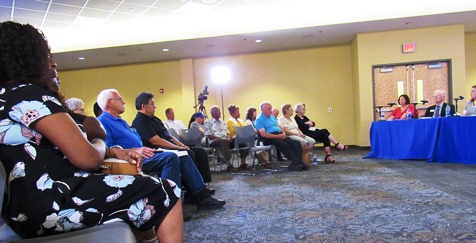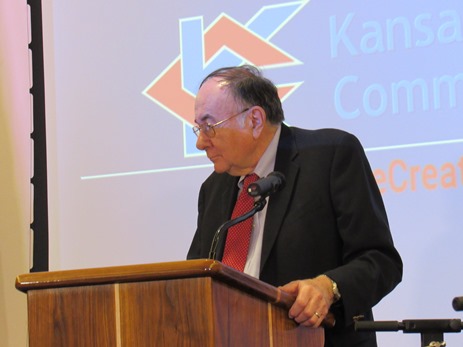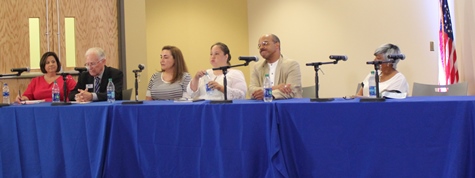
by Mary Rupert
There was disagreement among the candidates at a forum Wednesday on the Board of Public Utilities contests on the primary election ballot.
“We are shushed, we are misled,” said candidate Faith Rivera at the candidate forum Wednesday for the Board of Public Utilities at large, 3rd District contest.
The incumbent, BPU President Norm Scott, didn’t see it that way, answering the charges of the challengers, saying the BPU is open and transparent, and remarking, “We have the best water in the world.”
High electric bills were mentioned frequently at the meeting. The incumbent, however, shifted some of the responsibility for that to the Unified Government, which places a PILOT tax, similar to a franchise fee, on the bill, with other fees.
“I hear a lot about the PILOT (payment-in-lieu-of-taxes) tax,” Scott said. “That happens to be the UG’s. It doesn’t have anything to do with us. It’s a pass-through that shows up on our bill.”
Candidate David Haley said he was running for BPU at large, 3rd District, “for the people to have a better quality of life” so they’re not paying such an onerous bill.
The most crowded contest in the primary election is the Board of Public Utilities at large, position 3, race, with six candidates running.
Candidates for the position explained their reasons for running at the forum Wednesday night at the Kansas City Kansas Community College Dr. Burke Technical Education Center, 6565 State Ave. The forum was sponsored by Business West and KCKCC.
The candidates running are Incumbent Norman D. Scott, Chiquita C. Coggs, state Sen. David Haley, Rose Mulvany Henry, Melissa Oropeza-Vail and Faith L. Rivera. The primary election is Tuesday, Aug. 6.
Candidates expressed views about rates, customer service, communication, public ownership, electric cutoffs, renewable energy, regulatory oversight and other topics at the forum.
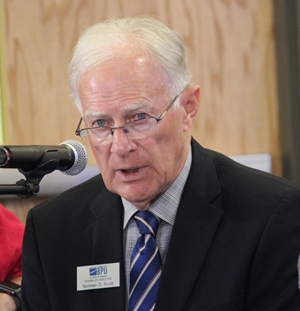
BPU bills and customer service were frequently mentioned by those running for office.
Norman Scott, president of the BPU board, answered some of the challengers at the forum, saying the board meetings are open, the minutes are available, as well as agendas. The hot and cold weather policies are available to anyone who wants them, he said.
“I hear a lot about the PILOT (payment-in-lieu of taxes) tax,” he said. “That happens to be the UG’s. It doesn’t have anything to do with us. It’s a pass-through that shows up on our bill.”
Charges that show up on the BPU bill, besides the charge for water and lights, include the trash service for the city, storm sewer service, PILOT fee and other charges that all go to the UG, he said.
Asked if the BPU should quit shutting off customers’ electricity altogether for nonpayment because at times the weather can be life-threatening, Scott said while BPU does shut off utilities because of nonpayment, it has nothing to do with the weather.
A BPU customer earlier this year told the board that her utilities were shut off as soon as the weather went above the freezing mark, which is the policy allowing shutoffs that is outlined in the cold weather shutoff policy. The customer said the temperature went above 32 degrees only for a short while, the utilities were cut off, then dropped below freezing again, and children were affected. The BPU also has a hot weather policy that says electricity will not be cut off if the forecast says the temperature will rise above 95 degrees that day. Utility officials have said the BPU policy is similar to other cold and hot weather rules in the metropolitan area.
“It’s always a concern when anybody, no matter whether they paid the bill or not, doesn’t have air-conditioning when it’s 100 degrees or when it’s 20 below,” Scott said. “That’s always concerning.”
There are policies in place for it, he said, and the information about them is available. There is help in the customer service lobby to help people pay the bills, including several payment plans, he added. BPU currently has a financial hardship assistance program in place through the United Way to assist customers. As a nonprofit, the BPU’s extra money goes back into the community, Scott said.
“The rates are very comparable,” Scott said, who worked in the construction field for 40 years before retirement in 2001 as a business agent from the International Union of Operating Engineers, Local 101. “We have the best water in the world.”
He also praised the electric service. Reliability is part of their motto, he said. A native of Kansas City, Kansas, Scott is a graduate of Wyandotte High School and attended classes at Kansas City Kansas Community College. He is a past president of the Stony Point Neighborhood Association. He first ran for BPU office in 2015.
“That little thermostat that sits on the wall belongs to you,” he said. When people are having trouble with their bills, they should see if the thermostat is turned up too high or too low, he said.
Scott said he is against the idea of allowing the Kansas Corporation Commission, which regulates private utilities, to answer BPU customers’ questions.
“We are responsive to the public; that’s why we are elected. When our term comes around, we can be re-elected or not, depending on what we did,” Scott said. “Our voices are available, through the reports of every meeting. We are doing very fine.”
Water rates haven’t been raised in seven years and electric rates will not be raised for the next two years, he said.
The BPU was mandated by the Environmental Protection Agency to upgrade its Nearman coal plant, which cost the utility a lot, and is still being paid, he said. The BPU’s financial department is very good, he said, the board members watch over all the financial reports, ask hard questions, and get good answers.
In answer to a question about renewable energy goals, Scott said when he first was elected, renewable energy was 22 percent at the BPU and now it is 45 percent-plus.
“I do believe in renewable energy because I thoroughly believe we’ve got a world that needs our attention,” he said. “We need more and more green energy.”
BPU has wind, solar, hydro, methane gas renewable energy, and a solar farm at the Nearman plant, he said. Customers can buy a panel that is located at the solar farm, he said.
“It’s the wave of the future,” he said. The BPU has upgraded its coal plant, but in the future, coal plants may be on the way out, he added.
Scott said he has been very responsive to the people who call him. He said he tries to address their problems, and it is on his own time.
“I am very passionate about the whole community,” Scott said. “When I make a decision, it’s always with you in mind.”
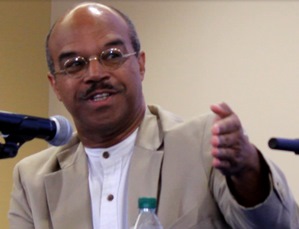
David Haley, a native of Kansas City, Kansas, who has served in the state Senate and House for about 25 years and has a significant amount of name recognition with voters, is one of three state legislators or former legislators running in the BPU and UG primary this year.
Responding to a question about utility cutoffs, Sen. Haley said his campaign is committed to a top-to-bottom review and comparison of policies to other utilities in the state. He would like to make sure the customers of BPU are not disadvantaged or overly advantaged in terms of policies when compared with the other utilities. He said he supports a dialogue about the BPU.
“When the ratepayers and consumers feel as if we were disadvantaged, and that we’re set upon by a syndicate that is too often nonresponsive, we have to do something,” Sen. Haley said.
The public utility is a “jewel,” Haley told the audience.
As ratepayers that own the utility, the customers are the shareholders, and when they are not getting the return on the investment and rates are disproportionately high, there should be a concern about a more livable publicly owned utility, according to Haley.
Every election cycle, candidates say they need to make the publicly owned utility more directly responsive to the livable component of life in Wyandotte County, he said. The BPU doesn’t need to be sold, he said. There needs to be a majority on the board that understands the public’s needs of Wyandotte County and still makes it work, leading to a better quality of life because they’re not paying such an onerous bill, he said.
Sen. Haley introduced a bill earlier this year in the Senate that would allow BPU customers to seek answers to their questions from the Kansas Corporation Commission, which regulates private utilities, but not municipally owned utilities. The bill did not pass the Legislature.
At the candidate forum Sen. Haley said, “We know they don’t” respond, referring to the BPU and customers. He said he didn’t want the BPU to be “under” the KCC, but for customers to have their questions answered. The KCC also holds rate hearings for private utilities, but that was not part of Haley’s idea for the BPU.
Haley said he wants Kansas City, Kansas, residents to have the same rights as every other Kansan, able to ask questions about policies and issues.
On Thursday, the day after the forum, the BPU posted on social media that it will be adding a question-and-answer box to its web page for customer communication.
Sen. Haley said they should look at renewable energy when it is cost efficient. He would like to see the BPU continue on the path of renewable energy.
There is a major concern now with the cost of utilities and the effect on the rate base has to be considered, he said. If rates continue to be high, he would be concerned, as he wants to have a better quality of life and better rates for consumers in Wyandotte County.
There is one main issue, he said.
“People have problems with the BPU, and they go from year to year to year,” Sen. Haley said.
“When I tell you I’ll do something,” he said, “I’m going to be there.”
Sen. Haley, a public affairs counsel, is involved in real estate development and public speaking. He is a graduate of Morehouse College in Atlanta, Georgia, and Howard University Law School in Washington, D.C. He has previously run for other offices including mayor and Kansas secretary of state.
Sen. Haley said after the forum that he is planning to run for his Senate seat again. He is not, however, planning to run for mayor in the next election, he added. He said his campaign treasurer is former state Sen. Chris Steineger. Steineger introduced legislation concerning the BPU several years ago.
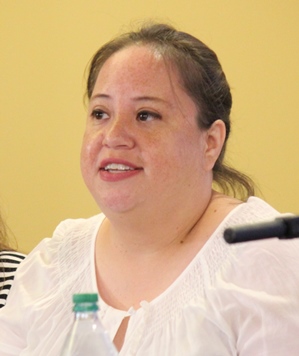
Faith Rivera said she was a single mother from the Rosedale area of Kansas City, Kansas, who knows what it is like to struggle, as many residents do. She became a certified electrician and is a weatherization tech, and said she loves renewable energy.
“I have been going to BPU board meetings and I see the treatment and the dis-customer service that we get from our BPU servants,” she said. “And this is something that we own. I am here running for the people that are looking for a change, for their bills to go down.”
She said the PILOT (payment in lieu of taxes) fee on BPU bills was “atrocious,” and there is a need for more information about policies at the BPU.
In answer to a question about whether electric cutoffs should be eliminated, Rivera said she was at a board meeting when a vote was taken that very slightly revised the electric cutoff policy earlier this year. She said they need to investigate the cutoff policy.
“We need to come up with a policy that best suits the community,” she said. “Let us get input from our customers.”
She said these policies should be in the minutes of the meetings. She felt she didn’t have a say in the issue at the time when it was passed.
What’s great about having the BPU owned by the community is the community has a voice, she said.
“The BPU needs to be community driven,” she said. “Unfortunately, currently we’re not able to have a voice. We are shushed, we are misled, given misinformation, which is why I’m running for BPU at large.”
She said the BPU needs to offer some things that KCPL has, such as weatherization programs and door testing.
Rivera said the BPU should work together with the KCC on policies and incorporate information from them.
“We still need to be community-driven,” she said, “because we need to have a voice here.”
There are a lot of people that are just trying to make ends meet, she said. It’s not that they don’t want to pay their bills, it’s that they can’t pay their bills, she said. People are trying, but as rates go up and policies hinder them, they’re just going to be under water again, she added.
Rivera said when she was in school, she made a solar panel out of an old window frame.
“Some people say it’s not affordable, I would tell you you could go online and make this,” she said. To pay over $400 for solar panels is just “outrageous,” she said. “I do believe that going green is our future,” she said.
Forty-seven percent renewable energy sources are great, but the community needs to be at least 90 percent, she said. In 20 years, the systems will not be able to be used, because they will be outdated, she said.
Rivera said she comes from a fighting family and will be out there fighting for the community.
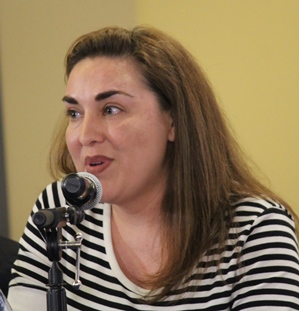
Melissa Oropeza-Vail, a nurse practitioner and a fourth-generation Wyandotte County resident, said she is running because a lot of people are upset about their BPU bills.
She said there is a need for more transparency and accountability, and the website is not easy to use.
Oropeza-Vail also was at the meeting concerning the cutoff policy, and the policy had not been reconsidered for about 25 years, she said, and only when a resident came to the meeting and told them about it.
“We should definitely as a community help each other,” she said, adding that a fund for those who are experiencing hard times is a great idea. “We all live together in this community.”
Having the opportunity to pick the BPU board is a great opportunity compared to privately owned utilities elsewhere, she said.
About the KCC, Oropeza-Vail said, “Once you open that door, it’s not one that is going to be able to be closed easily.”
Changing to something that is more of a partnership, but not the KCC overtaking the BPU, would be more in the best interest to the community, she said. Great thought would have to be given to this idea, she said, as to the consequences long-term to the community as well as to the utility.
Oropeza-Vail said sustainability is a goal for the future. Right now, BPU offers one solar panel for $470 for customers.
“We’re having people who cannot afford their bills, paying from month to month,” she said. “I think it’s a great idea,” she said. “I would love to buy one, but you would have to live in Wyandotte County for 10 years, to get anything back, long term, looking at the money.”
It’s a wonderful idea, a great opportunity, but not cost effective and not something people can do, being a lower-income population, she said.
“It’s definitely the wave of the future and something we have to start looking forward to,” she said.
Oropeza-Vail said she is an advocate for her patients and wants to be an advocate for community members. She said she wanted to bring transparency and accountability to the board.
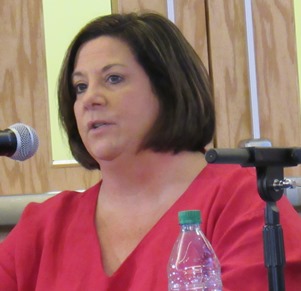
Rose Mulvany Henry, a lifelong resident, is an attorney who has practiced in the utility industry for 25 years. She has an undergraduate degree from the University of Kansas and a law degree from Washburn University.
She said she had the opportunity to work closely with the BPU last year as an outside contractor for the Unified Government, and thought she might be able to make a difference.
“I’m in this to hopefully provide some leadership, hopefully provide some experience, hopefully bring some background, some problem-solving,” she said. “These problems have been around this utility my entire life.”
In response to a question about the cutoff policy, she said they would have to look at this community, which is different from a lot of other communities.
“Almost a quarter of our neighbors live at or below the poverty level,” Mulvany Henry said. “You’ve got people on fixed incomes with problems paying the bills sometimes. If you don’t have policies that address our community, I’m not sure what good policies are.”
If persons are having trouble getting a copy of the policy, that could be a problem, she said. To the extent a community fund is developed that helps people pay their bills, that is great, she said.
Asked about a private vs. public utility, Mulvany Henry said it can be an extremely beneficial asset to the community to have a municipally owned utility.
She did not think it a good idea to place the BPU under the Kansas Corporation Commission.
“I worked there,” she said. “I sat on the inside of the table. I would trust our community to make decisions for our utility more than I would trust an outside entity.”
She said she’s not sure the KCC would do what’s best for the community, and the community is different.
She said she didn’t know if a partnership would work with the KCC, but a partnership with the Citizens’ Utility Ratepayer Board, a group within the agency that deals with consumers, might be a better idea, although she didn’t know if it would work.
“But if you get into a situation where you become a highly regulated company like that, it’s going to increase your costs,” Mulvany Henry said. “Ultimately the ratepayers pay that.” Any company under the KCC jurisdiction pays costs, through ratepayers.
People may be under the impression that the KCC handles enquiries better than the BPU, she said.
“I’m not sure that’s the case,” she said. “I’ve sat on the other side of the table, so I have some experience there. But, to try to work toward becoming world-class customer service, that is absolutely something we as a community should want, and that we as a community should absolutely demand.”
While her experience is limited with the BPU board, she said she feels at times the board may lack compassion. “Putting a little of that back in probably wouldn’t hurt anybody,” she said.
“We have to have a utility that works for us,” she said. “I think we have an opportunity right now, with leadership, to make this sustainable into the future.”
On the question of a goal for renewable energy, Mulvany Henry said BPU is currently over 40 percent renewables, and exceeds what the state requires. Part of the question is, can the community afford it? she asked. She said she didn’t know the answer, but about 24 percent of the population is below the poverty level, she added. Renewable energy is not inexpensive, she said. It is a wonderful aspirational goal, she added.
“If you have customer segments that are interested in going with solar, or some alternative renewable energy, that’s a wonderful thing, but I think you might want to privatize that,” Mulvany Henry said. Some customers who are interested in it could be charged for it, she said. But she is not sure that every single customer in the community could afford that.
Mulvany Henry said her home is here, her business is here and she cares about the community. Putting somebody in who has been in the industry for a long time probably can’t hurt things, she said.
“I’m in this for us, this is our utility, we own it,” she said. “We ought to make sure it’s managed properly, we ought to work collaboratively with the general manager, who’s new, we should make sure we are doing what we can for the ratepayers of our community.”
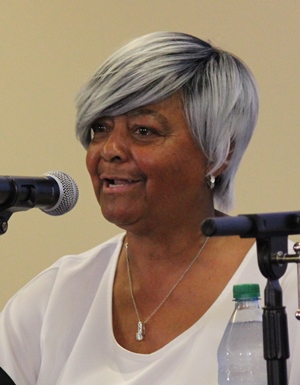
Chiquita Coggs, who was the head of an agency at the state level for several years, said there are a lot of positive things happening at the BPU.
She said there are a couple things she would be interested in finding out more information to make sure there are affordable rates, that they are not paying extra fees, that the BPU is not trying to compete with all other cities and states, and “that we can deal with our ratepayers and their ability to pay their utilities so they are not shut off of their services, if that is possible.”
In 2018, Coggs ran for the 36th District, Kansas House seat. She was the executive director of the Kansas Board of Cosmetology from 2011 to 2018.
More details about this forum will be available on a video to be shown on the KCKCC cable television station and on YouTube in future days.
